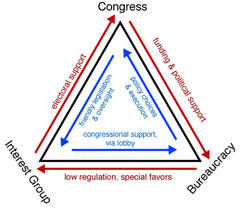AP Government Budget and Bureaucracy – Flashcards
Unlock all answers in this set
Unlock answersquestion
Bureaucracy
answer
Any large, complex administrative structure; a hierarchical organization with job specialization and complex rules. By definition, it is not privately owned. All bureaucracies are based on the principles of hierarchy, job specialization, and formal rules. The main purpose of the federal bureaucracy is to carry out the policy decisions of the President and Congress.
question
Methods of gaining power in a bureaucracy
answer
Three ways by which the bureaucracy can gain power: - If it becomes too large as to be immune from public control - By placing power over a governmental bureaucracy in private rather than public hands - By placing discretionary authority in the hands of a public agency whereas the exercise of that power is not responsive to the public good - Three theories that explain the growth of the bureaucracy To consume available resources - Personnel are promoted up to that point where their incompetence becomes manifest - They maximize their total budget
question
Reasons bureaucracies are criticized
answer
non-elected officials
question
Stereotypes of bureaucracies
answer
portray it as unresponsive, lethargic, undemocratic, and incompetent.
question
Quasi-Legislative Powers
answer
Administrative agency exercises its rule-making authority
question
Quasi-Executive Powers
answer
Carry out rules and regulations
question
Quasi-Judicial Powers
answer
Issue fines, justice dept.
question
Patronage
answer
Granting favors or giving contracts or making appointments to office in return for political support
question
Pendleton Civil Service Act
answer
Created a system in which federal employees were chosen on the basis of competitive examinations, thus making merit, not patronage, the reason for hiring people to fill federal positions.
question
Civil Service
answer
Government bureaucracy; non-elected agents ("worker bees") that work for executive agencies to execute the law; hierarchical organization, job specialization, detailed rules & procedures, administrative discretion. Massive growth since New Deal & WWII (2.5m people = nation's largest employer)
question
Merit Principal
answer
the idea that hiring should be based on entrance exams and promotion ratings to produce administration by people with talent and skill
question
Hatch Act
answer
Created a non-partisan civil service (protecting government workers from the risk of being fired when a new party comes to power). It prohibits civil servants from active participation in partisan politics. Under the terms of the Hatch Act, civil servants are permitted to vote in primary elections, contribute money to a political party, attend a political rally, and place a bumper sticker on their personal property
question
Plum Book
answer
A publication that lists the top jobs in the bureaucracy to which the president will appoint people through the patronage system.
question
Independent Regulatory Commission/Agencies
answer
Federal regulatory agencies that are independent, thus not fully under the power of the president. Ex. Federal Trade Commission, Securities and Exchange Commission.
question
Cabinet
answer
1. The head of each department is known as the secretary, except for the Justice Department which is headed by the attorney general. 2. Department secretaries are appointed by the President with the approval of the Senate. Cabinet members can be fired by the President. 3. Together, the department secretaries serve as the President's cabinet. There are 14 cabinet departments. • The Treasury Department - responsible for monetary policy • The Department of Defense - responsible for national security • The State Department - responsible for foreign policy
question
Government Corporations
answer
Provide a service that can be readily handled by the private sector. These corporations are within the executive branch, and they are under the control of the President. Top officers are appointed by the President with Senate confirmation; all of their employees are public officials. The Postal Service and the Tennessee Valley Authority are examples of government corporations.
question
Independent Executive Agencies
answer
Are created by Congress and which operates outside the 14 executive departments in the cabinet. Three types of independent agencies: independent executive agencies, independent regulatory commissions, and government corporations. (The Office of Personnel Management, the Peace Corps and the Civil Rights Commission are examples of independent executive agencies which are "supposed" to be free from political influence).
question
Iron Triangle

answer
Iron triangles are composed of bureaucratic agencies, interest groups, and congressional committees. The iron triangle is characterized by mutual dependency, in which each element provides key services, information, or policy for the others.
question
Issue Network
answer
Relationships among interest groups, congressional committees and subcommittees, and the government agencies that share a common policy concern.
question
Entitlements
answer
Programs such as unemployment insurance, disaster relief, or disability payments that provide benefits to all eligible citizens. Governmental expenses that are permanent and can only be changed with amendments to laws. Of the $3.5 trillion dollars that the federal government spends, more than $2 trillion is spent on entitlement spending. Problems: Hard to change and expensive.
question
Budget Process steps
answer
1. President's budget (OMB) 2. Congressional Budget Action (CBO) - Adoption of budget resolution - Passage of annual appropriation bills 3. Implementation: President signs 13 bills (come out of appropriation committees) - compromise/agree and end up raising spending 4. Audit & Review
question
Deficit and Debt
answer
Debt = deficits added together
question
The Debt Crisis (includes Sequester)
answer
US massive debt problem Sequester = involves setting a hard cap on the amount of government spending, limiting the size of the Federal budget
question
Congressional Budget and Impoundment Control Act of 1974
answer
Modified the role of Congress in the federal budgetary process. It created standing budget committees in both the House and the Senate, established the Congressional Budget Office, and moved the beginning of the fiscal year from July 1 to October 1.
question
Congressional Budget Office
answer
Advises Congress on the probable consequences of its decisions, forecasts revenues, and is a counterweight to the president's Office of Management and Budget.
question
Office of Management and Budget
answer
EOP agency that helps the President prepare annual budget proposal and evaluates budget priorities and effectiveness of federal agencies (oversight)
question
Budget Resolution
answer
A resolution binding Congress to a total expenditure level, supposedly the bottom line of all federal spending for all programs.
question
Congressional Control of Bureaucracy
answer
Authorization and Appropriation and Oversight
question
Executive Control of Bureaucracy
answer
presidents try to appoint best possible people; president can reorganize bureaucracy and can make changes in annual budget requests from agencies and ignore legislative initiatives; issue executive orders
question
How does the bureaucracy wield its power?
answer
crises (natural, foreign, economic) citizen demands
question
Discuss the common reasons of why bureaucracies are so powerful.
answer
Discretionary authority Expertise - merit (Pendleton Act) Continuity Ability to control policy (iron triangle)
question
Discuss the growth and character of regulation in America (why bureaucracies have become so important)
answer
We have become dependent on programs like Social security
question
How is the bureaucracy controlled?
answer
Executive - appointments, fire bureaucrats, OMB Legislative - legislation, oversight, appropriation/authorization Judicial - judicial review
question
Explain why the budget process is a classic example of the definition of politics (who gets what, when and how)
answer
To budget = fight over money who = actors what = budget $ how = political process budget = ultimate example of politics
question
Explain why much of the government's expenditures are considered "uncontrollable."
answer
money going out > money coming in
question
Predict the impact of the current budget crisis on federal policies.
answer
Spending way more on programs than taxes to pay the program they will probably need reevaluate programs or raise the eligible age for Social Security
question
expenditures
answer
Government spending. Major areas of federal spending are social services and national defense.
question
revenues
answer
The financial resources of the government. The individual income tax and social security tax are two major sources of revenue.
question
tax expenditures
answer
revenue losses that result from special exemptions, exclusions, or deductions allowed by federal tax law.
question
What limits the bureaucracy
answer
1. Spending appropriations 2. Pendleton Act - merit based 3. Oversight
question
How does the President control the bureaucracy
answer
Appointments Fire bureaucrats Office of Management and Budget (funds bureaucracy)
question
How does Congress control the bureaucracy
answer
Legislation Oversight Appropriation/authorization
question
budget request
answer
blueprint for next year
question
Omnibus bill
answer
A single document that is accepted in a single vote by a legislature but contains amendments to a number of other laws or even many entirely new laws.
question
Implementation
answer
Policy is implemented through the activities of public bureaucracies and the expenditure of public funds.



